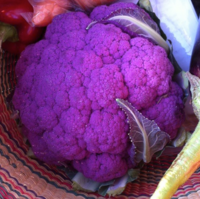
Photo from wikipedia
ABSTRACT Microgreens are young plants that are consumed at the seedling stage, which present short production cycle and require little space for growing. The objective of the present study was… Click to show full abstract
ABSTRACT Microgreens are young plants that are consumed at the seedling stage, which present short production cycle and require little space for growing. The objective of the present study was to evaluate the yield and nutritional quality of purple cabbage (Brassica oleracea var. capitata f. rubra) microgreens grown in different substrates and nutrient concentrations in the nutritive solution, in a recirculating irrigation system. The experiment was conducted in a protected environment at the Faculty of Agronomy (UFRGS), in Porto Alegre, RS, Brazil. A completely randomized design and three replications were used, with a 4×3 factorial arrangement consisted of four commercial substrates (CSC® vermiculite, Beifiur® S10, Carolina Soil® seedling, and Carolina Soil® organic) and three nutrient concentrations in the nutritive solution (0%, 50%, and 100%). A sub-irrigation system was used for the irrigations. The variables evaluate were: shoot fresh matter yield (SFMY), shoot dry matter yield (SDMY), shoot height at harvest (SHH), production cycle (precocity), and total soluble solids (TSS), total chlorophyll, and carotenoid contents. The different substrates had no effect on the SFMY, SDMY, and SHH of the purple cabbage microgreens; the increasing addition of nutrients to the nutritive solution increased the values of these variables. The TSS and total carotenoid contents decreased as the nutrient concentration in the nutritive solution was increased. The responses of total chlorophyll contents to the substrates and the nutrient concentrations in the nutritive solution varied.
Journal Title: Revista Caatinga
Year Published: 2019
Link to full text (if available)
Share on Social Media: Sign Up to like & get
recommendations!